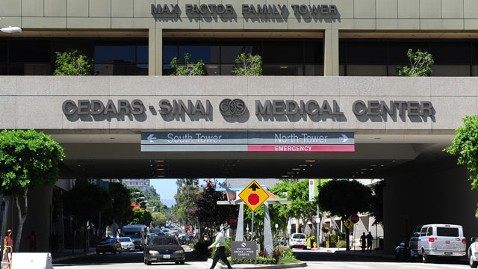Heart Surgeon Gives Patients Infection When Glove Rips

Credit: Frederic J. Brown/AFP/Getty Images
A heart surgeon at Cedars-Sinai Medical Center accidentally gave cardiac infections to five patients because his latex gloves tore during surgery, hospital officials confirmed.
Of the five patients who were diagnosed with endocarditis, or an infection of the heart chamber lining and valves, four of them had to return to the hospital for a second operation, according to a story first published in the Los Angeles Times. The patients survived and are still recovering.
"Because our ultimate goal is to have zero hospital acquired-infections, any hospital-acquired infection at Cedars-Sinai is unacceptable," a hospital statement read.
"Endocarditis in general is a problem in that it describes an infection inside the heart, and when we have an infection inside the heart, bacteria from the infection is pumped all over," said Dr. Mark Adelman, the chief of vascular surgery at NYU Langone Medical Center. "It's a particularly bad infection."
Adelman, who has not been involved in the Cedars-Sinai case, said valve replacement infections can be especially problematic because the new valves are artificial and have no blood vessels to carry antibiotics to the infection.
"Usually the valve has to be removed," he said. "Artificial materials don't have blood vessels running through them, so there are little cracks and crevices that don't see much blood flow. They're difficult to sterilize."
According to the National Institutes of Health, endocarditis can require a second valve replacement surgery when the infection results in heart failure, results in other organ damage or when blood clots break off into little pieces to cause strokes. Complications can include brain abscesses as well.
Cedars-Sinai called the incident a "very unusual occurrence," according to the Los Angeles Times. Administrators told the newspaper that the nature of valve replacement surgery can lead to microscopic rips in the surgeon's gloves because he has to tie more than 100 knots and use thick sutures, both of which put extra stress on the gloves.
"It's just like tying your shoes a thousand times; it wears a lot on your fingers," Adelman said, adding that heart surgeons have to sew the heart muscle with strong knots and sutures because it's an organ that is constantly moving. "The gloves definitely degrade. They have to be thick enough that they protect from transmitting infections, but then you have to feel tissues."
Although surgeons will sometimes wear double gloves, it's not mandated and can sometimes make the surgery more difficult because thick gloves don't allow surgeons' fingers to be as sensitive or as nimble, Adelman said.
He said he's been asked why surgeons scrub their hands if they're going to wear gloves. The answer is twofold: Surgeons scrub their hands and wear gloves to protect the patient, but they wear the gloves to protect themselves. It's possible that a patient could spread a disease to a surgeon, too.
The California Department of Public Health has an open investigation at Cedars-Sinai, department spokesman Ralph Montano said. Because the department's investigation is ongoing, Montano could not elaborate on the details.
Hospitals nationwide reported 529,038 surgical site infections to the Centers for Disease Control and Prevention in 2010.
News of the endocarditis infections comes less than a month after Cedars-Sinai announced that it reduced surgical site infections by more than 60 percent for colorectal procedures because of new protocols.